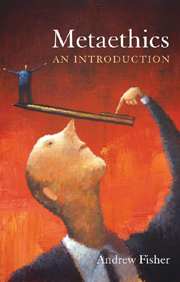Book contents
- Frontmatter
- Contents
- Preface
- Introduction
- 1 The open question argument
- 2 Emotivism
- 3 Error theory
- 4 Moral realism and naturalism
- 5 Moral realism and non-naturalism
- 6 Quasi-realism
- 7 Moral relativism
- 8 Moral psychology
- 9 Moral epistemology
- 10 Fictionalism and non-descriptive cognitivism
- Questions
- Glossary
- References
- Index
Introduction
- Frontmatter
- Contents
- Preface
- Introduction
- 1 The open question argument
- 2 Emotivism
- 3 Error theory
- 4 Moral realism and naturalism
- 5 Moral realism and non-naturalism
- 6 Quasi-realism
- 7 Moral relativism
- 8 Moral psychology
- 9 Moral epistemology
- 10 Fictionalism and non-descriptive cognitivism
- Questions
- Glossary
- References
- Index
Summary
If you are not confused then you are not paying attention.
(Tom Peters)CHAPTER AIMS
To explain what metaethics is, and how it differs from normative and applied ethics.
To outline two considerations when developing a metaethical position.
To explain some key terms and common misunderstandings in metaethics.
Introduction
We know that when Nero used Christians as human candles he did something wrong. It seems true to us that the civil rights movement is a good thing. It is a fact that racism is wrong. If a culture thinks it right to torture children to death then they are mistaken.
But can we really have moral knowledge? What is it for a moral claim to be true? In what sense is it a fact that racism is wrong? How can something be right and wrong independently of what people think?
These are all metaethical questions and it is the aim of this book to give you the resources to start to answer them. But why are these questions classed as metaethical? What is metaethics anyway?
One useful way of answering this question is by contrasting metaethics with applied ethics and normative ethics. Consider an analogy that will illustrate the contrast: imagine ethics as football. We can equate different things associated with football with the different disciplines of ethics. There are the players, whom we can think of as applied ethicists.
- Type
- Chapter
- Information
- MetaethicsAn Introduction, pp. 1 - 10Publisher: Acumen PublishingPrint publication year: 2011



